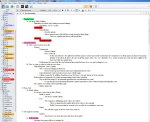 This is the fifth installment in my Scrivener Series, which showcases how I use Scrivener write entire novel series. Be sure to check out my writing process post for quick links to the currently published posts and a preview of what I’m going to cover next.
This is the fifth installment in my Scrivener Series, which showcases how I use Scrivener write entire novel series. Be sure to check out my writing process post for quick links to the currently published posts and a preview of what I’m going to cover next.
By now I’ve been writing up a storm in the universe of my novel. It’s still a very random storm but it’s starting to coalesce into something nice and terrifying, a molten doom planet of madness.
At this point in the process things are really humming along. I’ve stopped writing random scenes, finished digging up facts and compiling them for easy reference while I write and finished my first chapter, second chapter, maybe my third and fourth. By now I’ve got a pretty sizable word count (say around about 50k) on my hands and I should be sitting on cloud nine knowing that all is write with my world.
But I’m not.
Something is wrong – very, very wrong – with each paragraph, no, with each and every word, the certainty grows. Wrong, all wrong and getting worse fast. Part of me screams that I’m in too deep! There’s no turning back now! If it’s that wrong I’ll have to toss more than half of the book! Despair overwhelms me and my head hits the desk. Repeatedly.

But there’s hope, thanks to Scrivener!
Re-outline
When I wrote my first novel and came to the point where I realized it all just didn’t work, things weren’t flowing properly the pace was stagnant and dead and I couldn’t figure out how to write myself out of the muck I’d made for myself – I tossed the whole thing in a drawer and left it there, for five years. I’d have thrown it out entirely (that came later to my second novel when it hit a similar sticking point) but I still thought that maybe somewhere in the future, maybe when novels were written entirely with software linked directly to our brains, it could be saved. Eventually I came back to it, printed the whole thing out, marked up each page with notes and created a separate document for an entirely new outline while I ripped it apart and tried to put the pieces back together in a way that made more sense than the original. It was a mess, painful, frustrating process that involved many paper cuts and printer ink refills before I was ready to continue with the story again.
I don’t recommend it. All told, from start to finish, that novel (“The Uncertainty of Death”) took seven bloody years to complete. Not nearly fast enough to come close to earning a living as a writer. My second novel (a horror novel I might start again someday) went straight into the trash and when my third (“Ash of Ambitions”) hit a similar, though slightly less throat-slitty, wall I was kind of beside myself with frustration and self loathing.
I began using Scrivener with “In the Absence of Famine” and didn’t hit quite the same wall but with “Toxic Ash” I didn’t just hit it – it fell on me. There was a moment of black panic as the weight of the thousands and thousands of words I’d already written slammed down on me. Then the dust settled and I was able to realize I could fix it, starting with the outline and working my way out.


Pictured above are side by side screens of my outline before the wall and after. Just the first few sections as I rearranged things mostly by manually copy/pasting from one section of my Scrivener document to the other. Sometimes adding in connections that were missing or deleting connections that were present in the previous. The evolution of the outline is obvious though it’s hard to really get a feeling for the flow seeing it this way but these first few sections were also the most heavily reordered. Again, this part was the only manual copy/pasting I really had to do largely thanks to the next section.
Reorder
I believe I’ve covered Scrivener’s handy dandy ability to move notes, scenes and even entire chapters around with a mouse click before. This is only one of many moments where it really shines. My novel’s Scrivener structure is pretty basic: each novel is a folder, with that folder each chapter is another folder, within those folders each scene is a document. In my outlines it averages out that each numbered section is about a chapter and the subsections are scenes (more or less, remember it’s an imprecise map).
So once I’ve edited my outline/map it’s a simple thing to move around the scene/chapters to match. Pretty much click and drag. A far cry from my days with a dozen pens, hundreds of papers and paperclips and a million paper cut/migraine combos.
Since this was my first time trying this method (just encase I decided later that I wanted to go back to the beginning again) I copied everything I had done so far and moved them all to temporary folders within each chapter, then copied those sections so I could play with the order without losing the old order. Not strictly necessary but gives me an easy backup point if I need it. That just leaves one more step.
Rewrite
This is probably the hardest part. Reading through your reordered chapters and scenes, making connections and transitions, checking for plot holes, sometimes rewriting entirely from scratch. There really isn’t much I can say about this slog except that at least it’s better than editing!
Now you’ve got the most drastic rewrite out of the way and it’s been hard, very hard, but it hasn’t been turn your eyes away from writing for years and years and hate yourself and your work and the gods and anyone else that looks at you cross eyed and asks about that “book” you were “writing” kind of hard. Which is actually almost easy by comparison. So we’ll call it “easy” and wink when we say it.
Next up on my Scrivener Series: exporting the draft!
Don’t forget if you want to skip the extra blather about my writing process and just go to the next book release, you can always sign up for email notification!







